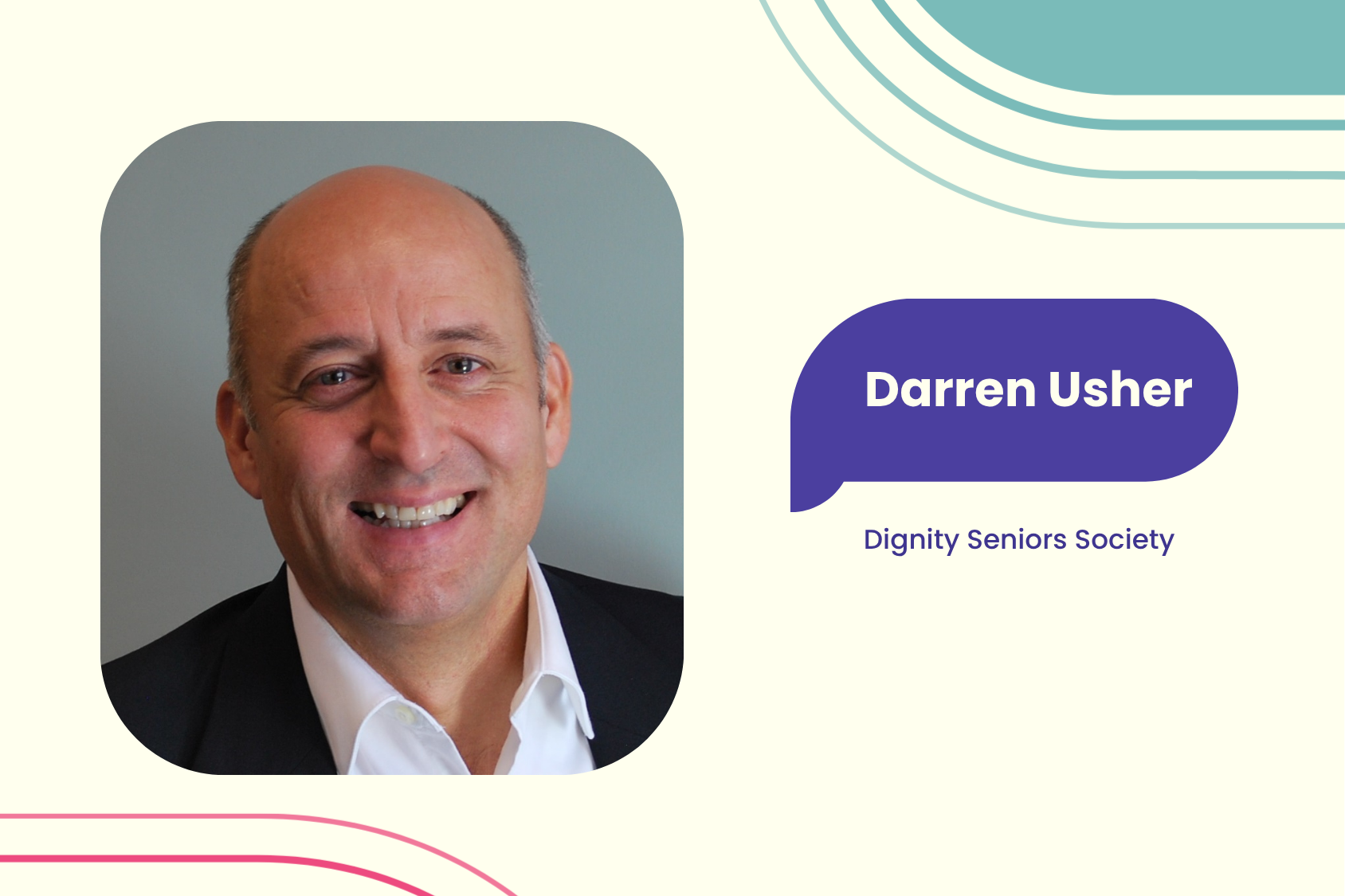In this section :
Content note: This story discusses experiences of trauma, discrimination, and other sensitive topics that may be distressing to some readers.
Some wounds never show on the surface. They live quietly in the way a person lowers their voice or glances around before speaking their truth.
Darren Usher has dedicated himself to tending those invisible injuries, the ones left by decades of being silenced, shamed, and forgotten. As Chair of Dignity Seniors Society in British Columbia, he works with and for 2SLGBTQIA+ seniors to make care safer, more inclusive and rooted in dignity. For him, safety begins with connection – with being seen, heard, and free to be yourself.
“Safer,” not “safe”
When asked what safe care means for 2SLGBTQIA+ seniors, Darren takes a long pause before answering. “I’ve never liked the word safe,” he says. “It promises too much. I prefer safer.”
Safety, he explains, grows with each person, shaped by trust, experience and care. “When care is culturally appropriate,” he adds, “it becomes safer by default. But that only happens when providers take the time to listen and learn. You can’t meet one trans person and assume you understand everyone – each person defines what safety means to them.”
Meeting people where they are
That belief underpins Dignity Seniors Society’s trauma-informed, strengths-based approach – especially through We Are Familee, a volunteer-led initiative that helps 2SLGBTQIA+ older adults to age in place, supported in part by Healthcare Excellence Canada through the Enabling Aging in Place collaborative.
“It’s about not making the participant fit your program, but making your program fit the participant,” Darren explains. “It requires flexibility. You build around the person’s pace and needs, not the volunteer’s schedule.”
The change, he says, can be slow at first but deeply meaningful. “Some participants who were bed-bound at the start are now active and engaged months later. They rediscover that their community cares about them. That’s powerful.”
For many, those small acts of connection – a weekly visit, a shared meal, a conversation – are not just kindness; they are lifelines.
The weight of isolation
Darren doesn’t soften the truth. Isolation, he says, leaves marks that go far beyond loneliness.
“Our older adults lived through decades when being gay was illegal, when it was called a mental illness. You learn to protect yourself. You become invisible.”
That instinct to hide doesn’t disappear with age. In long-term care, Darren often meets community members sitting quietly at the edges of rooms, listening while others share stories about children and grandchildren. “They edit themselves,” he says, “because they assume no one wants to hear their stories.”
That invisibility, Darren explains, is not neutrality – it’s a response to harm. And when people silence themselves out of fear, it deepens the very isolation that endangers their wellbeing.
What service providers can do
For Darren, inclusion begins with something simple: giving people the space to say and be who they are. He believes safety grows from recognition, from being invited to share and trusted to be heard.
“Provide that opportunity on intake forms, in documentation, in conversation,” he says. “And do it for everyone. When it’s a standard practice, it tells our older adults that you understand.”
Many will not share right away. “They may not fill in the box the first time,” Darren says. “But each time you ask, you’re opening a door. You’re showing that you care. The more doors you open, the more trust you build.”
Small gestures, he adds, can signal safety long before words are exchanged – introducing yourself with your pronouns, for instance, or acknowledging a person’s partner when you greet them. “It tells people you see them,” he says. “That you want to get it right.”
From the silent cohort to the pride cohort
Part of Dignity Seniors Society’s work is understanding generational differences. Darren describes many of the people they serve as belonging to what researchers call the silent cohort.
“They grew up before decriminalization, before homosexuality was removed from the DSM,” he says, referring to the Diagnostic and Statistical Manual of Mental Disorders, where it was once listed as a mental illness. “They learned to hide. They still call their partner of forty years their ‘friend’ or ‘flatmate.’ We often feel so much socially induced shame,” he says.
He sees this as a matter of social justice. “We have a responsibility as a society to repair the damage we did in the 1950s and ’60s,” he says. “Many went through conversion therapy, electric shock therapy, even lobotomies. Those who didn’t still heard the stories. That fear stayed with them.”
But change, Darren notes, is already taking shape. “The pride cohort – those who came of age after legalization – are entering the system now. They won’t hide. They won’t be silent. They’ll be activists. And our job is to prepare service providers to meet those activists, because they will demand change.”
This shift, he says, will challenge healthcare systems to evolve – to design care with people, not for them, and to ensure that every interaction upholds dignity and equity.
Looking ahead
For Darren, the work is both personal and collective – an act of repair and of possibility. Each conversation, each act of care, helps rebuild trust in systems that once caused harm.
He knows change takes time. But he also sees proof every day that it’s happening – in the voices that no longer whisper, and in the quiet certainty that no one should have to hide to be cared for.
To learn more about Dignity Seniors Society and its work to support 2SLGBTQIA+ older adults, visit www.dignityseniors.org.
